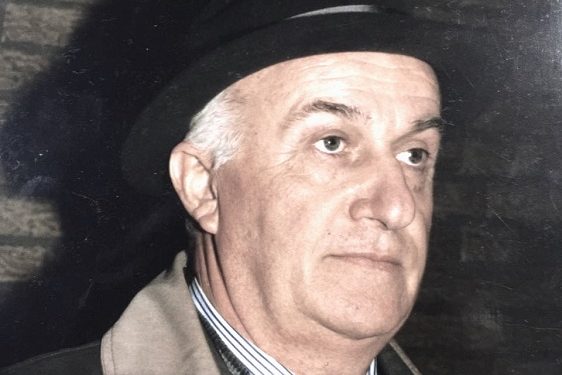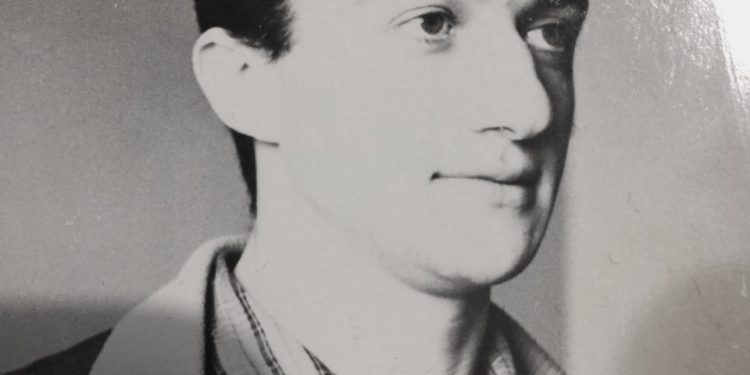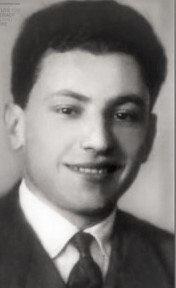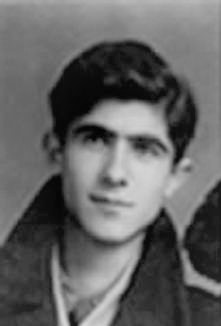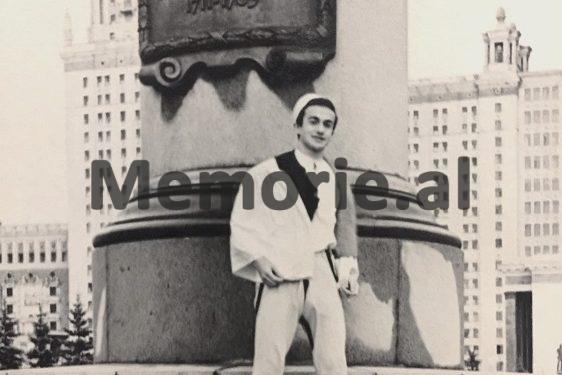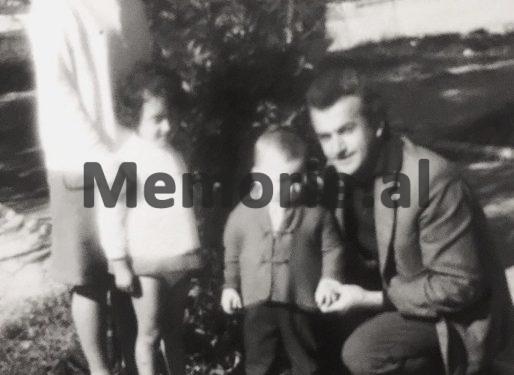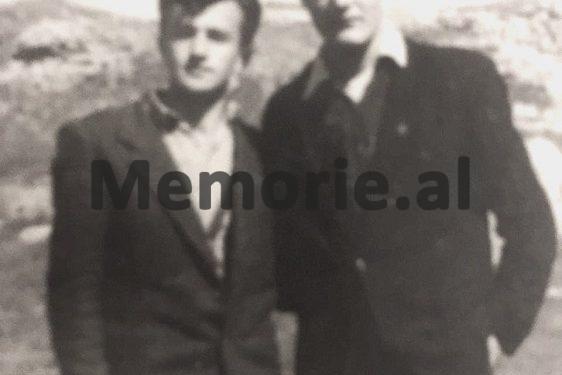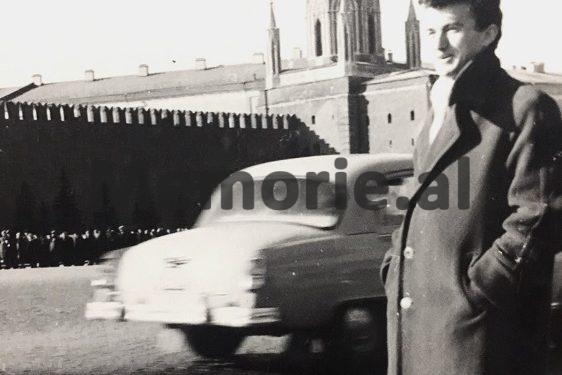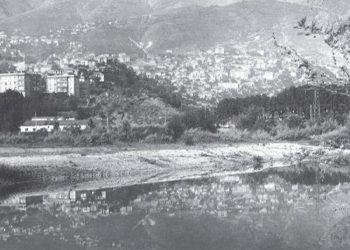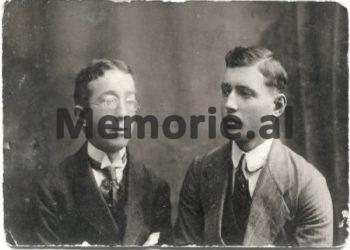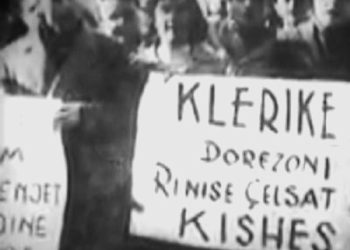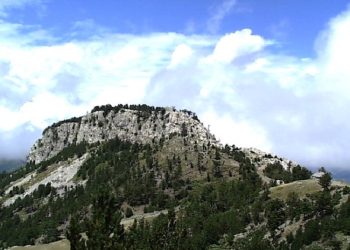By Sokrat Shyti
Part Seventeen
Memorie.al / The writer Sokrat Shyti is the “great unknown” who, for several years, has revealed the tip of the iceberg of his literary creativity. I say this based on the limited number of his published books in recent years, primarily the voluminous novel “Nata fantazmë” (Tirana 2014). His novels: “PËRTEJ MISTERIT”, “MES TUNDIMIT DHE VORBULLËS”, “GËRRYERJET E MAKTHIT”, “HIJA E TURPIT DHE E VDEKJES”, “KOLONELI KRYEDHJAK”, “SHPRESAT E NËMURA”, “PËSHTJELLIMET E FATIT” I, II, “MBIJETESA NË KASOLLEN E LOPËS”, as well as other works, all novels ranging from 350 to 550 pages, are in manuscript form waiting to be published. The dreams and initial excitement of the young novelist, returning from studies abroad full of energy and love for art and literature, were cut short early on by the brutal edge of communist dictatorship.
Who is Sokrat Shyti?
Having returned from studies at Moscow State University, right after the rupture of Albanian-Soviet relations in 1960, Sokrat Shyti worked at Radio “Diapazon” (which at that time was located on Kavaja Street), in an editorial office with his journalist friends – Vangjel Lezho and Fadil Kokomani – both later arrested and subsequently executed by the communist regime. Besides the radio, Sokrati, at the age of 21, if we may imagine, had passionate literary interests at that time. He wrote his first novel “Madam doktoresha” and was on the verge of publication, but… alas! Right after the arrest of his friends, to fill the cup, a brother of his, a painter, fled abroad.
Sokrat was arrested in September 1963, and in November of that year, he was sent into internment (together with his mother and younger sister) to a location between Ardenica and Kolonje in Lushnja. For 27 consecutive years, the family lived in a livestock shed made of reeds, without windows, while Sokrat was subjected to forced labor. During these 27 years, he was legally obligated to report three times a day to the regional authority. He had no right to move from the place of internment and was deprived of any kind of documentation, etc. In these conditions, among a livestock shed, he gave birth and raised his children. It was precisely from this event, or rather a very long history of persecution, that he was inspired to write the book “Survival in the Livestock Shed”!
Agron Tufa
Continued from the previous issue
EXCERPT FROM THE BOOK, “SURVIVAL IN THE COW SHED”
In the 3-story building of the District Court, on “Durrësi Street,” a high-profile trial was held for several days against the hostile group of journalists, (which included Vangjeli and Fadili from Radio-Difuzion, Trifon Xhagjika from the “Luftëtari” newspaper, editor Robert Vullkani from the “8 Nëntori” Publishing House, and tenor Stavri Rafaeli. Like all other judicial processes of that time, this one, as a staged farce, was based on “facts” that were almost comical, fabricated by the State Security, according to a sinister script, to demonstrate to the entire capitalist and revisionist world that: “The People’s Power in Albania dances in the mouth of the wolf”! “No force can subdue the revolutionary vigilance of the Dictatorship of the Proletariat”!
“American Imperialism and Soviet Revisionism are destined to fail”! Meanwhile, “The glorious Party of Labor – led by the undeterred Timonier, Enver Hoxha, the worthy continuer of victorious Marxism-Leninism – achieves success from victory to victory”! In the end, the verdict was given: two military defendants were sentenced to death! Vangjeli and Fadili received 25 years in prison! Robert received 20 years!
After the trial against the journalists concluded and the sentences were given, the shadow of threat loomed like a ghost throughout the studios and editorial offices. I could not shake the image of my comrade from my mind when I sat down to write the scheduled materials. The shaved heads of the defendants often outlined themselves in my thoughts.
And among them shone like a star the dazzling gaze of Vangjeli! I was struck by how much courage and bravery he displayed in answering the insidious questions of the judge, the prosecutor, how freely and openly he presented his intellectual perspectives, forcing the two powerful jurists to roughly interrupt his words! When his gaze swept over the hall and briefly slipped over my face, cloaked in sadness, I felt like a snail peeking out of its shell, convinced that the day would not be long in coming when I would fall prey to the traps of the organs of the Dictatorship of the Proletariat!…
As expected, the overwhelming pressure of this farcical trial affected my feelings for a long time, causing me such severe headaches that it made it impossible for me to work normally. The doctors advised me to be hospitalized for diagnosis and treatment. But even after the treatment, I did not find relief; the pain continued. Therefore, it became essential to consult with the distinguished Albanian doctor, Professor Sinani, who was fortunately here.
After the examination, he diagnosed damage to the occipital nerve and suggested a block with novocaine and hydrocortisone, at three points in the head, one on the forehead and two behind it, to be repeated three times. This complicated procedure was successfully performed by the renowned surgeon, Dr. Shyti. Since it was the first time it was being done in our hospitals, many doctors gathered to observe and learn from the new experience. (But the heavier burden of endurance fell on me, as I had to clench my teeth tightly, to endure the severe pain without cries or moans because the treatment would be done without local anesthesia, as a condition to maximize its effect).
Therefore, the distinguished surgeon, before starting the procedure, advised me to demonstrate the maximum level of behavior expected from a cultured patient, so as not to cause any disturbances, considering that this procedure requires perfect precision, and the slightest movement could lead to missing the target.
Returning to the Radio, after treatment and leaving the hospital, felt entirely different from the first day I stepped into the mysterious building. It was not only because I was no longer curious about the nature of the work and the composition of the collective, but also because within this environment, I had gone through and experienced countless nightmares, most of all the elegant silhouette of Vangjeli, tall and imposing, echoed in my ears with his descriptions of the dazzling auroras, which he compared to the astonishing beauty of his little angel, often repeating that he was ready to flirt with death, to the last drop of blood, so that nothing would be lacking.
From time to time, I asked myself: would the day come when he would see the girl of his soul, even after twenty-five years, when he emerges from the terrifying prison cells? Or would he never see the light of freedom, as the hellish executioners, using hours and moments of inhumane torture, would not allow him to stay alive, even in a transfigured state like a corpse?!…
When I returned to work after leaving the hospital, I noticed something quite disturbing: a terrifying haze of gossip had risen around me and almost everyone looked at me askew! But especially among the envious, hatred was openly displayed: they waited impatiently for the dreadful moment to engulf me quickly, as the infernal malice gnawed at them inside and terrified them by someone else’s success, particularly when someone stood out in their field! Thus, whenever they saw me walking down the corridor, a wicked, malicious feeling engulfed them, as if at that moment, they were gripped by the Earth’s disease. And when they opened their mouths or moved their lips, I felt as if they were getting ready to bite me stealthily if I wasn’t careful while passing by them!
But even among my well-wishers, noticeable changes appeared: first of all, they froze; they no longer came as before to my room to hear the new creations. The collective readings were forgotten. I no longer heard the petitions of female voices for me to read a story or a fairy tale because I had a tendency and valued the writing more! To reduce the bitterness of this almost hostile atmosphere, I shut myself in my room and focused entirely on the novel, pondering the questions: Why isn’t the green light for publication being given?! What is being discussed in the editorial offices of the Writers’ League? Who are the main opponents? Who holds more weight, the editor-in-chief of the magazine “Nëntori,” or the editor-in-chief of the literary newspaper?…
Or are the real insurmountable barriers the rivalries of the elite writers, accustomed to the pampering of party officials and powerful authorities, who stroll alongside them on the boulevard, thus have absolute confidence in national literary competitions and are convinced that the first and second prizes belong to them, allowing no other name to be mentioned, especially that of a young novelist, just twenty-one years old?!
Whenever these thoughts buzzed in my head, my eyes caught moving shadows on the long balcony: they were the eavesdroppers assigned by the Party and the Security to quietly observe what I was up to. And they waited impatiently for me to leave the room so they could pounce on me like hyenas on corpses, rummaging through drawers, hoping to find some piece of written paper, with the hope that within it, a questionable plot might be fabricated. Whenever their serpent-like gazes suddenly met my eyes, or felt the movement of the chair, the shadows would disappear in an instant.
As this terrifyingly suffocating situation became increasingly heavy, it gnawed at me more and more, I began to seriously think about changing my workplace. But this idea seemed utopian. Because my name as a creative journalist had begun to fade and wither in the eyes of every institutional leader.
No one wanted to have an employee in their organization who was a close friend of the Party’s enemy, sentenced to twenty-five years in prison. Reasoning this way, I concluded that not only should this dangerous thought not be revealed (which implicitly suggests “hiding and covering up the traces of cooperation with the traitor”), but rather, I should do everything possible to show that I had completely severed ties with the vile shadows that had stained the Radio-Difuzion with an indelible mark of shame, the most important institution of People’s Democratic Albania…!
On the morning of September 28, 1964, before 8:00 AM, as I crossed the iron gate and took my access pass from my pocket to show to the guard officer, an unknown man (certainly a Security employee) commanded me in a commanding tone not to go up to the fourth floor, as we would go together somewhere!…
“Don’t take it as a lack of politeness, but we are strictly prohibited from taking orders from unknown persons! Even if I knew you personally, I still wouldn’t comply. Because according to the internal regulations, the chief of the editorial office must be informed,” I replied, looking at him with suspicion.
“Do you think I came here on my own without notifying and getting permission from the Directorate?” he added in a harsh tone.
“I did not express that. I am simply fulfilling an obligation according to the regulations: for any departure, a verbal notice should be given, or a note should be left on the chief’s desk, so that my whereabouts and the reason for my absence from work are known,” I clarified.
“Then, to avoid breaking the regulations, I will call your chief from the guard officer’s booth,” he emphasized irritably and went there.
After this reply, a flood of speculations surged through my consciousness, each more troubling than the last, revolving around the same question: why had this unknown person come specifically for me and was insisting that we go together in an unspecified direction? Meanwhile, the possibility of an unexpected assignment to prepare an urgent report at a special department of the Ministry of Internal Affairs was not excluded; hence, my companion had arrived, as the regulations for extremely confidential objects of special importance did not allow the use of special authorization. To confirm my speculation, I did not have the courage to ask the unknown man, considering that this might raise suspicions. So, we set off in silence, like fish.
When we arrived at “Skanderbeg Square,” we headed towards “Dibrës Street.” I sensed that the unknown man was glancing at me stealthily from time to time. Perhaps he, too, did not like this annoying suffocating silence, and it might please him to exchange a few words if his duty didn’t impede him, as per orders, to maintain the secrecy of the service. And since I didn’t know how to respond, I returned to my initial thought, hoping that, indeed, a report needed to be made in a special department.
“No,” I immediately argued with myself. “How can I believe this absurd thought? It’s impossible that they would choose me, the journalist with a dubious shadow, the friend of the ‘enemy of the Party and the people,’ who was sentenced by the supreme military court to twenty-five years in prison!… The suspicion remained, which highlighted a terrifying doubt: that my association with this unknown individual, a State Security or secret police employee, was directly related to me! They certainly want to interrogate me, intending to start a new legal process against me, with the commonly used accusation: ‘passive collaborator with the enemy of the Party and the state,’ Vangjel Lezha.
Because, according to them, I knew his hostile intentions, primarily his escape, but I had concealed them from the organs of the Dictatorship of the Proletariat! This suspicion grew horrifyingly when we stopped in front of the three-story building at “Selvia,” which sometimes served as a police region and sometimes as a secret branch of the secret police for the city of Tirana. My companion went to the guard officer, grabbed the phone handle, and announced in a military tone: “Comrade Colonel! I brought the journalist.”
“Bring him up!” ordered a powerful voice. At that moment, my mind was struck by a chain reaction of terrifying doubts, each more frightening than the last. I began to analyze myself: generally, being a reserved person, I tend to be quite restrained and careful in providing answers when asked something like that. The only exception would be the meeting with Vangjeli when he graciously invited me to his place, where we drank two glasses of wine. Then we discussed various pressing philosophical issues related to current events.
Other than him, I have not sat with anyone else in any club and exchanged political, ideological, and social thoughts with anyone. Thus, the only risk could remain the testimony of Vangjeli during the interrogation, should he have mentioned my name in his responses. Under these circumstances, they want to hear from my mouth what issues we discussed and what conclusions we reached, in order to confront the two testimonies that would prove their accusations, that I have long been aware of the micro-bourgeois and revisionist views of the “enemy of the Party,” but did not open my heart to our Party, as I felt more pity for the enemy journalist than for the higher interests of our brave and noble people, who leap into flames and fire, to defend with their lives the ideals of Socialism!
According to this terrifying and frightening accusation, I was directly collaborating in thoughts with the “enemy of the Party,” even though I had never considered escaping, because if I wanted to, I could easily have done so without risking my life when I was a student in Moscow: I could have stayed there and not returned, like some others. Surprisingly, the environment of the room we entered astonished me with the appearance of an abandoned storeroom, as all the furniture and equipment necessary to call it a normal workplace were missing: in one corner, there was a metal bucket filled with water. Somewhere in the middle stood a table that had chipped paint.
Next to it was a chair with an unstable backrest. On the surface, there were some sheets of paper. And nothing else! Since I had never seen such a sad and gloomy room as this, at that moment I wondered if perhaps the police station was moving to a more suitable building, which is why the previous equipment had been sent there. But if I accepted this reasoning as true, I would have to answer the question: why should I come here, to see this miserable sight?!…
Heavy booted footsteps were heard on the stairs. Shortly after, a tall man appeared in the doorway, dressed in civilian clothes and a beige suit, who shot me a terribly fierce look that caused a chilling thrill to run through me!
“You can leave, comrade major!” he said to my companion in a commanding tone.
The major saluted with a crisp click of his heels, turned on his heel, and disappeared beyond the doorframe. After these words, I immediately fixed my mind on the thought that after a few questions, they would bind my hands with handcuffs! Otherwise, a senior officer with the rank of colonel would not be dealing with me! But the gloom of the room stirred my thoughts. I couldn’t understand why they had called me precisely here, in this empty environment, and not in the shadowy offices, where the keen interrogators prided themselves, with devices of torture lurking in the corners?!…
“The recent events have shown us that some of you journalists have experienced a mental breakdown. And do you know why? Because instead of your head, you’ve put your butt on your shoulders!” The colonel stunned me with this terrifyingly heavy insult. “Do you understand my language?!” he shouted with wild fury.
“I am trying to understand. But I still don’t know why I am here…” I replied, shaken.
“Since you don’t know, I’m getting straight to the point: tell me, where is your brother?” he asked with a ferocious glare.
“Which brother are you referring to?! The elder one is in the People’s Theater. As for the second one, you should know exactly, since he works in your organs…” I answered in a trembling voice. And I began to speculate that the reason I was here must be connected to one of my two brothers, most likely the second brother.
“And you, idiot, dare to ask me questions, you son of a dog?!… Do you think I can take your life at this moment with these hands?!” shouted the enraged colonel, approaching me. “Let me tell you: that Licky dish, your brother, whom the Party entrusted with the task of painter at the Border Directorate, broke through the fences, escaped to Greece, deceiving the local unit with his nonsense!… And you are guilty! You should have informed us, because he must have uttered to you, at least once, the intention of escape…” he added with an open threat, as if telling me, “Don’t think that you can cast off the cloak of deception unscathed and we will keep the fool that left us in the lurch, that rascal! Listen well: starting from this moment, we will pour our anger on your back! So don’t pretend to be the pretty devil in front of me, as if this news has shocked you…”
I did not hear the last words, because without realizing it, I had lost consciousness and collapsed like a tree trunk onto the floor!… The cold water from the bucket brought me back to my senses. When I opened my eyes, I saw his big head leaning close to his body, and the thick lips moving, reeking of tobacco. He was surely saying something. But in my ears, only incoherent syllables reached me, devoid of logical connection. When he saw that I was not moving, as I lay there wide-eyed, he lifted the bucket of water and prepared to pour it over my head. Therefore, to avoid suffering worse a second time, I made a strenuous effort to compose myself and grabbed onto one of the legs of the table, pushing my body upward.
“Are you mocking me, you idiot?!” he shouted with a hoarse voice, and in a lightning-fast motion, he punched me straight in the nose. I collapsed again onto the floor, bloodied.
“Here’s the bucket of water: rinse your face and sit in the chair. And don’t perform circus tricks for me, or I’ll take you somewhere you least expect, and you won’t see the light of the sun anymore!… Do you understand?”
“I understand this clearly. But I still don’t know what you want from me…” I managed to reply in a faint voice.
“Don’t worry about that, I’ll help you,” he retorted mockingly. “First, you’ll tell me how that rascal behaved at home: how he would turn yellow when he heard ‘Voice of America’ on the radio. And which station did he prefer to listen to most?… Start with that. Then the other things will come to your mind. Just open your eyes: don’t try to deceive me, or I’ll smash your face again!” he threatened.
“Comrade Colonel…”
“You don’t have the right to address me as ‘comrade’! – he interrupted me fiercely – From this moment on, you will use the word ‘mister.’ Is that clear?”
“Allow me to inform you, mister, that my middle brother comes home very rarely, only 2-3 times a month.”
“He used to come, but he will not come again. But these fairy tales, tell them to the children, not to a colonel with long experience in the field of investigation, who has uncovered the most refined agents of American and British imperialism!” he threatened me with his fist.
“My statements are verified by the neighbor, an older woman than my mother,” I added, to avoid receiving another punch. “Because the neighbor spends most of the day in our apartment.”
“But at night, when she is not there? It is your responsibility to tell me what discussions took place in your house when the painter sergeant came and went like a thief from long ago…?” the colonel emphasized with a sneer./Memorie.al
Continues next issue
Copyright©“Memorie.al”
All rights to this material are exclusively and irrevocably owned by “Memorie.al”, in accordance with Law No. 35/2016 “On Author’s Rights and Related Rights”. It is strictly prohibited to copy, publish, distribute, or transfer this material without the authorization of “Memorie.al”; otherwise, any violator will be held liable under Article 179 of Law 35/2016




